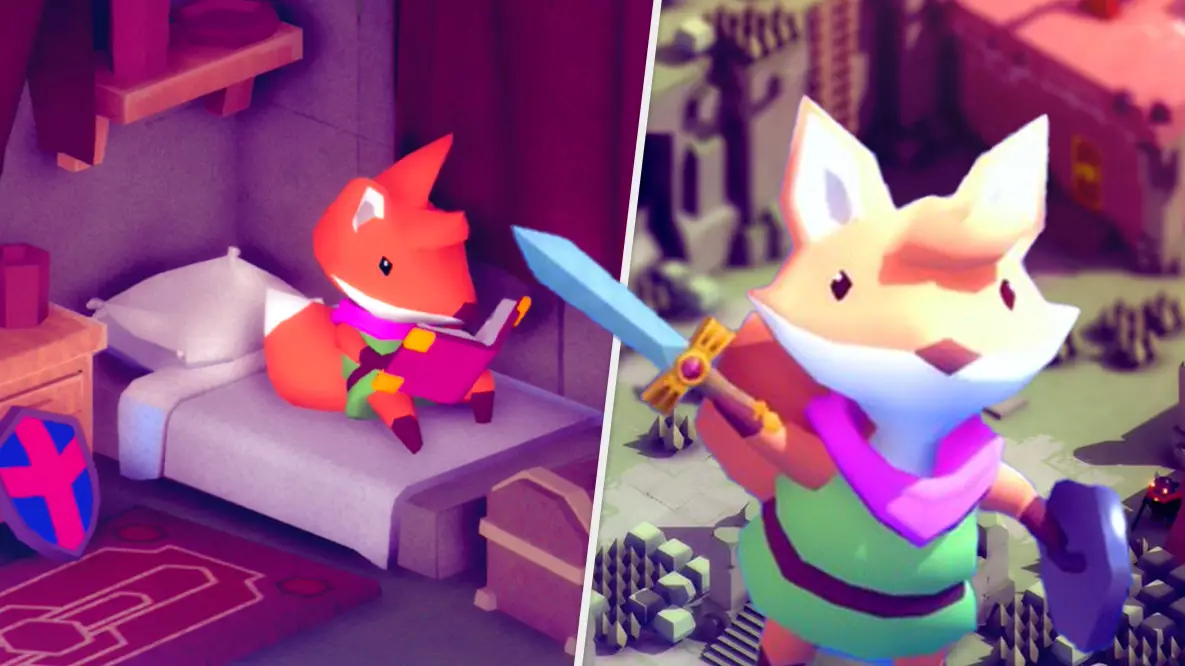
Andrew Shouldice has been working on Tunic for the better part of the last decade. Or, as he puts it, "the last 900 years".
In that time, his ambitious indie adventure has grown from a handful of intangible ideas scribbled in a notebook to a hotly anticipated adventure all about a tiny fox exploring a vast world full of secrets. From adorable gameplay trailers to a recently released hands-on demo, Tunic is already generating an admirable following of fans who have compared the game to everything from the original NES Zelda to Dark Souls.
For Andrew, it's a game about the thrill of discovery, the rush you get when you slowly start to make sense of a strange and hostile world. It is also, unavoidably, a game about a cute fox that swings a sword.
"I think in this video you can probably see at least... three foxes?" He gestures to a shelf behind him stacked with old notebooks and adorned with a small handful of felt foxes of various sizes. "But these are all gifts from people, because once you start making a game about a fox, everybody's like, 'oh, I know what Andrew would love!'"
Eager to get the big questions out of the way first, I've asked Andrew why he chose a fox to lead Tunic. For him, it is the perfect animal to represent that sense of adventure and exploration he hopes to evoke. But it was also born from necessity.
"Early on in the process I wanted to make this game about mystery and adventure," he tells me. "Fighting monsters and exploring. And I really like an isometric perspective, so all those ideas were floating around. And of course you need a player character that isn't just, you know, capsule, flapping about.
"When I was starting, my modelling skills weren't especially good. I was just really getting started with that sort of stuff, and the idea of making a character that realistically reads as a person, was sort of hard. Fox, on the other hand? That's easier! People can map themselves onto this genderless cypher of a character.
"Plus foxes get up to trouble! And the idea of you being a stranger in a strange land going into the place and getting into trouble makes sense. There's also, and I wish I was clever enough to have thought of this beforehand, but because a fox's tail is so big and it's got a pointy snout, directional facing in combat is immediately more intuitive. If your character is looking at things in the environment, it's like you're a little arrow pointing."
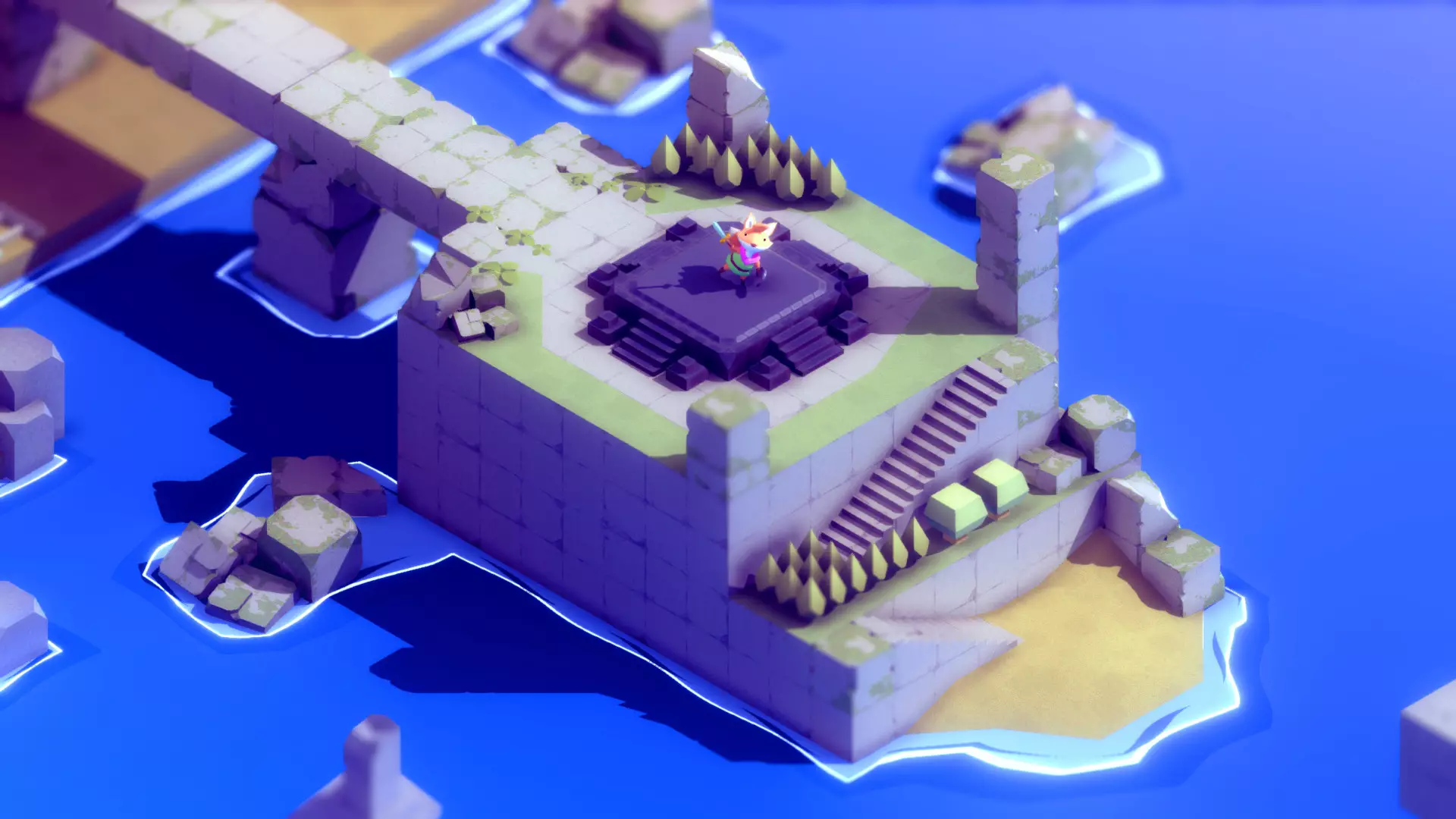
As far as Andrew can recall, Tunic started life as a page in a notebook of ideas that he tentatively titled "mystery".
"I feel like that's not quite the right word for this feeling that you get when you play a game and it's... I still don't have a perfect word to encapsulate it, but I guess mystery is the closest thing," he explains. "It's that feeling of there always being just a little bit more than you understand. That the next discovery that you have isn't just checking something off the list, but represents an expanding of the borders of your understanding of the game.
"For example, there's a cape in The Legend Of Zelda: A Link To The Past. It's this weird optional item that not everybody knows about. Or how Myst has all these switches on the island and the first thing you do is count them, or something like that. But they end up being really, fundamentally important. And so Tunic based on this idea of like, 'wow, this was this was here all along?!' You could have played for hours and suddenly you realise this secret baked into the fabric of this game is fundamental. The moment of discovery when you realise there's so much more to this than you thought."
If you've played the demo - and if you haven't you absolutely should - you'll understand what Andrew is trying to get at. Tunic is a game packed with secrets, one that urges you to look a little more closely at everything and wrestle its many mysteries into submission. Hidden treasures, items, hints, and shortcuts are at the very heart of this game, and Andrew clearly delights in peppering his colourful world with these riddles.
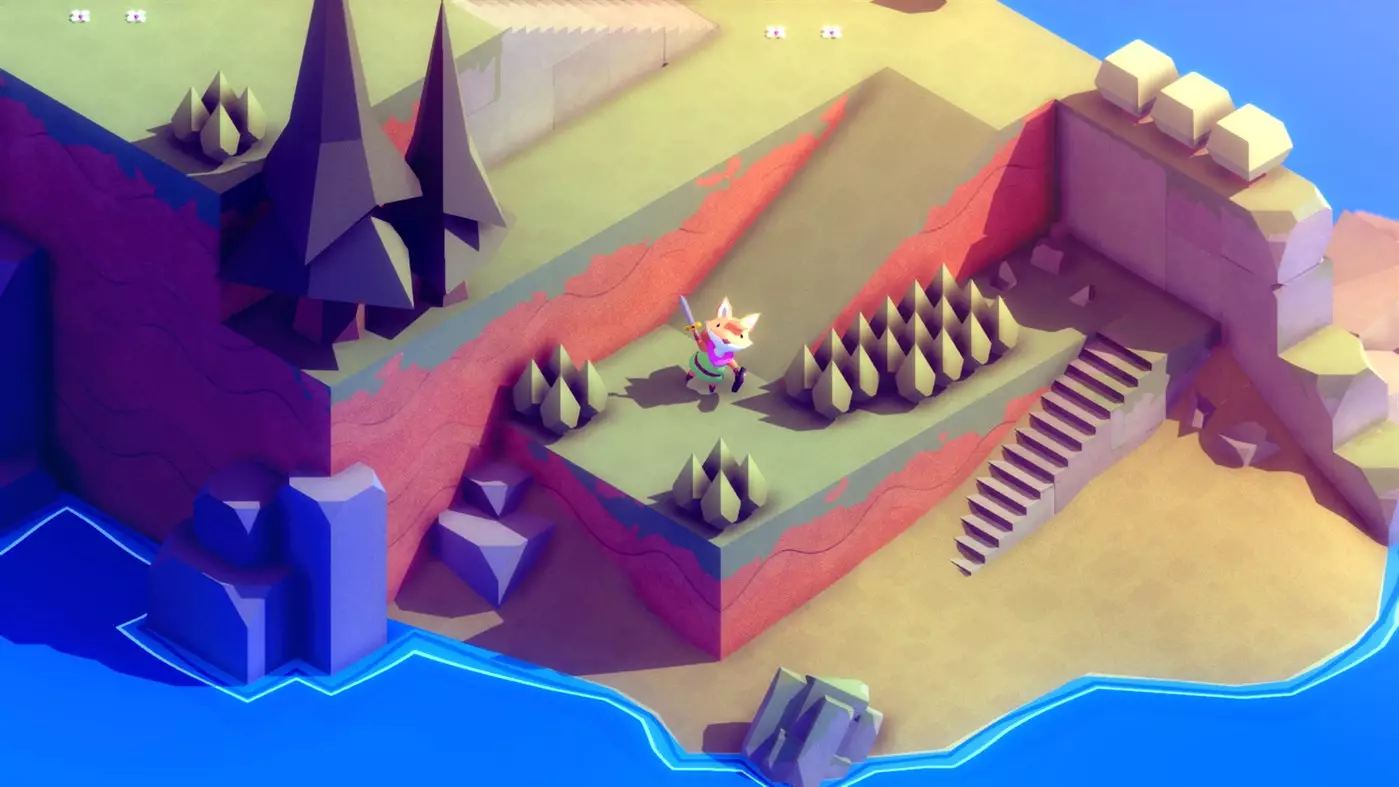
"Sometimes I'll implement something and not tell anyone," he jokes. "Of course there are a few people like the QA testers over at Finji, and our audio designer and level artist who are working on the game and it'll be weeks before I'm like, 'I should probably mention that I added that.'
"Sometimes those secrets are a little bit opaque and oblique," the developer admits. "But when we talk about adding secrets, we often add a percentage to them. Like, we have 90% secrets - it's not really a secret and most people will find this, but it feels like a secret. Then we'll talk about 10% secrets where you probably won't find it and you will need someone - a guide, a streamer, or a friend - to point you in the right direction.
"But those sorts of things never have a zero assigned to them. There's always a chance that someone's gonna find it. The very nature of the internet, and human beings at large, means that nothing we put in there is going to go unfound. There are some secrets that are intentionally designed to be, I guess you could say, fun things for us more than fun things for other people. Real winks and nods to anybody who decides that they really want to go deep."
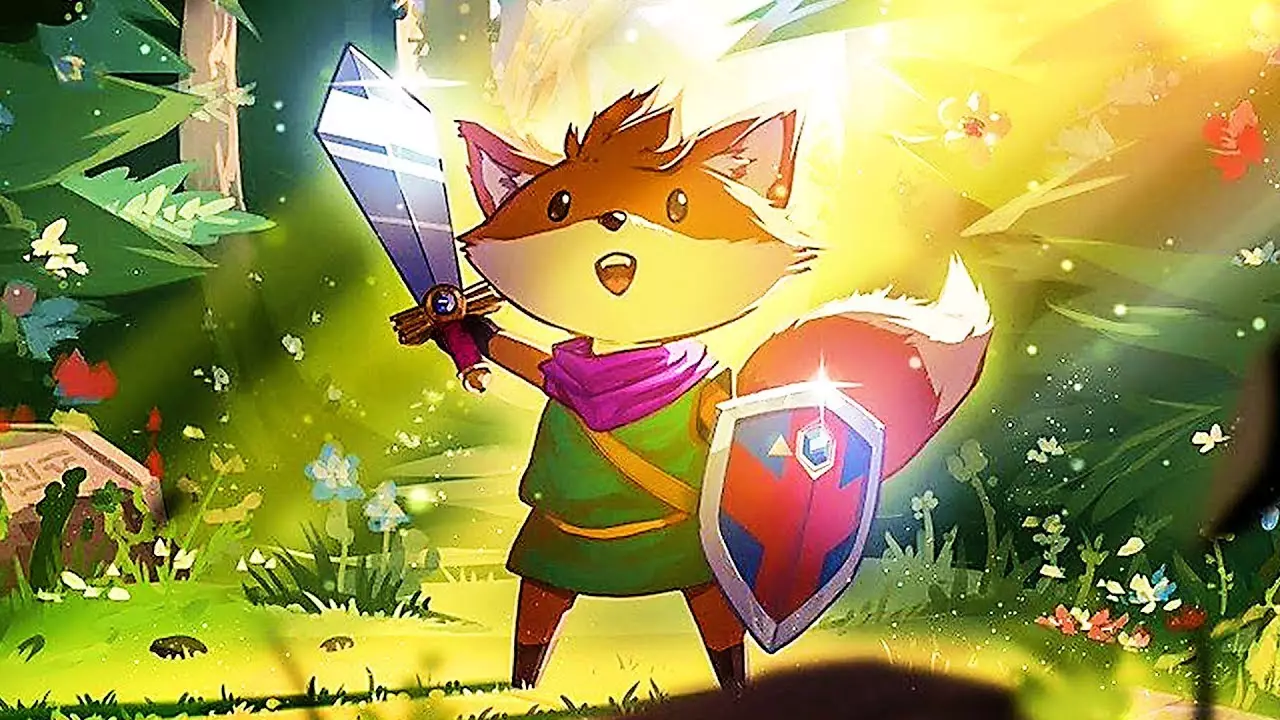
I ask Andrew if there's a particularly devilish streak in him that almost hopes there are secrets in Tunic nobody will ever find. Mysteries that will remain his alone to know, forever.
"Well the idea of a video game that is a downloadable executable means that someone out there is just going to decompile and reveal all those secrets, right?" he answers. "And on the one hand, it's frustrating that someone can just empty the bag out and see everything. But on the other hand, most people are going to want to avoid those spoilers and keep that mystery.
"The other side is there are plenty of things that I know and the team knows aren't in the game. Secrets that existed and no longer are actually in the game... but we'll always know they were there." He pauses for a second, then adds: "Although now that you mention it maybe I should just go in and just bury something."
Tunic inevitably invites comparisons to Dark Souls and early Zelda, not just in its approach to vague secrets and hidden paths, but in the fact that it can be an incredibly difficult game. That's impressive company to be in, but I wonder where the line is for Andrew and his team? How do they strike a balance between providing players with a challenge while still urging them to explore? As far as Tunic is concerned, those concepts go hand-in-hand. Players are absolutely urged to explore new areas and push forward in experimenting precisely because doing so will make the game easier in unexpected ways.
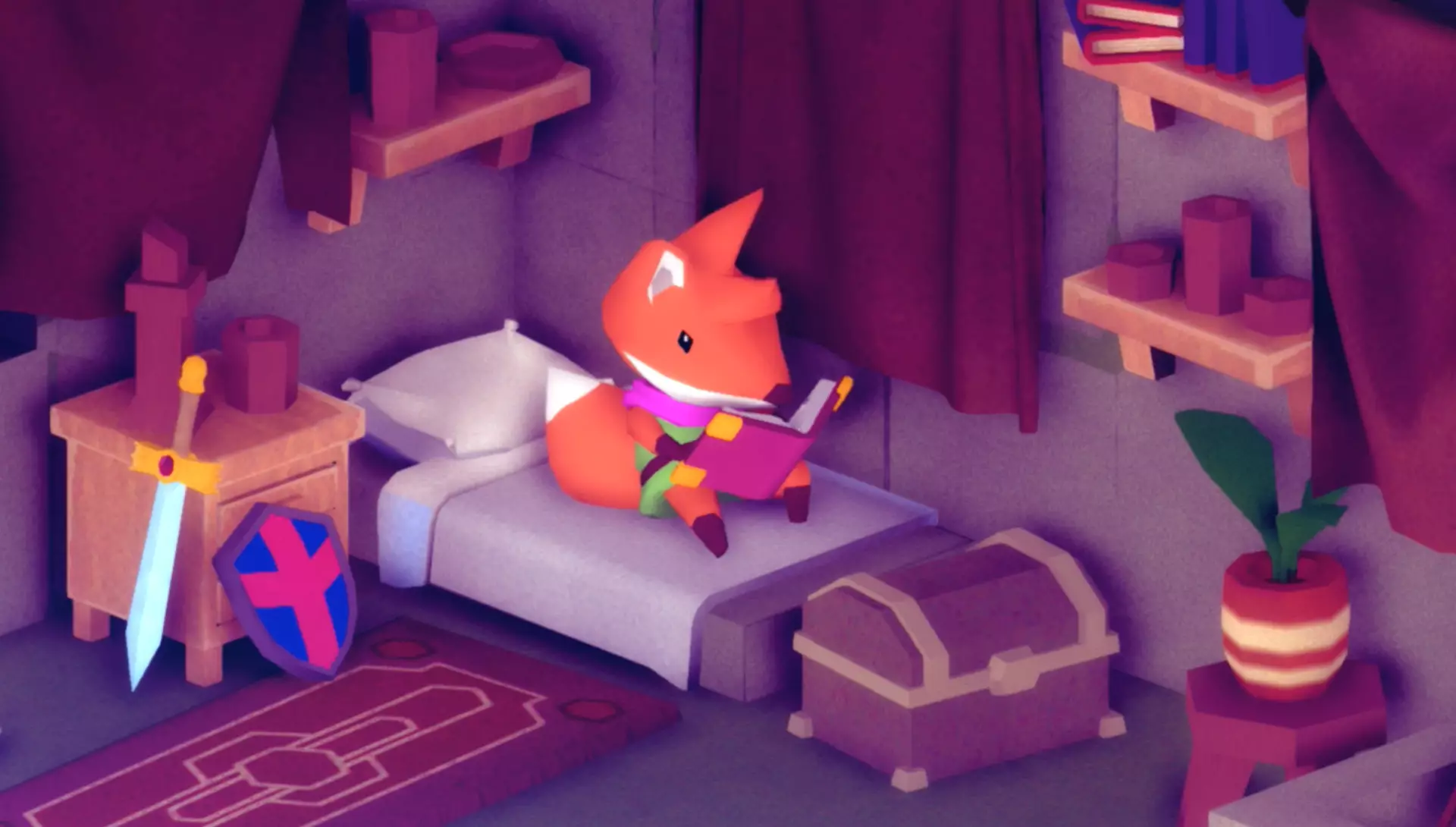
"One of the early design tenets of Tunic was 'soften hard gates'", he explains. "In Ocarina Of Time, you need the hookshot before you go to the Forest Temple, right? And that's fine and good, but far more interesting to me, is the idea that you probably want to have this item to do something. But technically? You don't need it.
"So this is where we talked about softening the gates, and there are definitely some hard gates in Tunic. But we want to make sure that there's at least a chance for everyone to get through. That's why we have these things that are really difficult. The sewer in the demo, for instance. There are enemies there that, if you don't pick up the shield, it's really difficult to deal with that. That's the game saying 'you need to use the shield'.
"Can you get through without? Maybe, but it's really, really, really hard. But knowing that you could do it if you were brave enough and skilled enough is exciting to me, because that represents the feeling sitting in the player's mind that at any moment they might be in a place where they're not actually supposed to be. That's exciting! It makes you feel like you've actually really found something.
"There's a - I've yet to make sure that this is technically possible - but there's a powerful weapon that you can get at the very start of the game. Like, even before you find the sword, you could grab this weapon by exploring and exploiting a bunch of secrets that not everybody's gonna find. I like the idea of items that do kind of give you an unfair advantage if you know where to look and use them the right way. That feels like you, the player, sort of stumbled into something that is really strong against this one situation, as opposed to that being the only path forward."
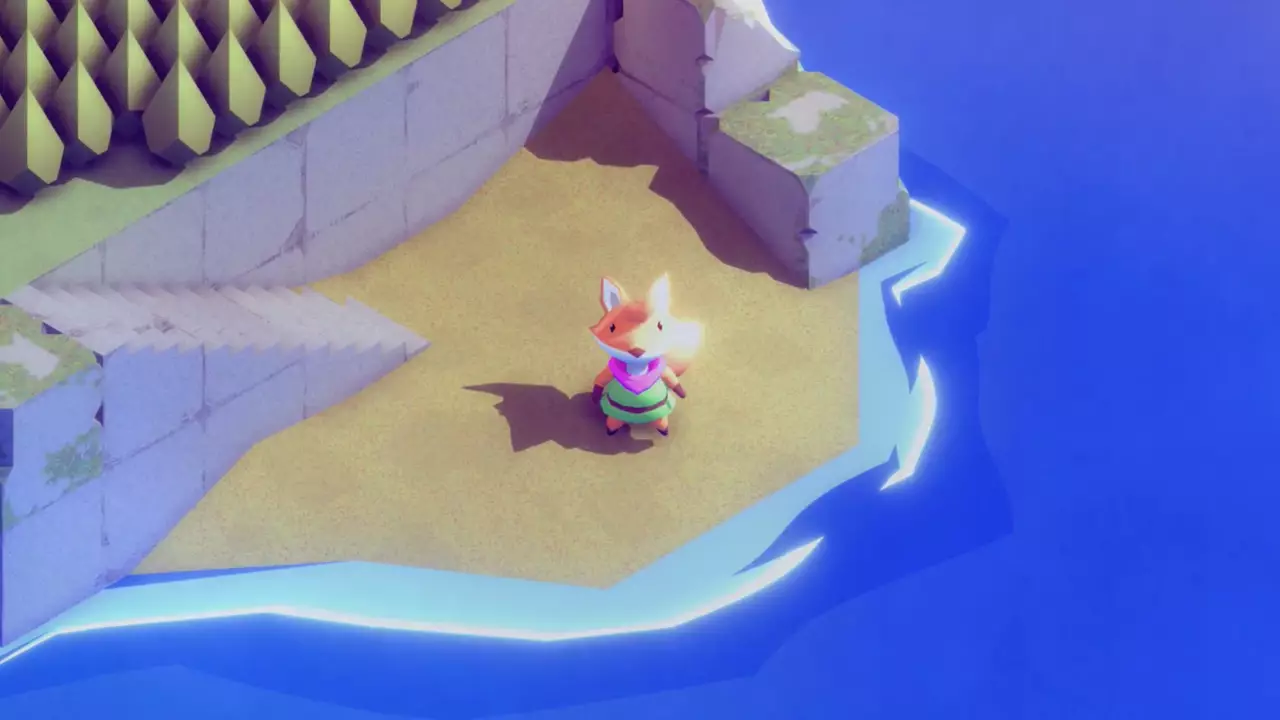
At various points throughout our interview, Andrew stops to wonder aloud whether or not he's explained himself to me properly. It's clear that for him, Tunic is a labour of love that is trying to capture something truly indefinable - and that can obviously be hard to put into words. He hasn't designed Tunic to be the hardest game ever made, or the cutest game you've ever seen, towering bosses and tiny foxes aside. He's designed Tunic in an attempt to help us all feel the way we felt when we played our first video game. To recapture that moment of stumbling into a world beyond our imagination and realising that anything is possible.
I've no idea if the final product will succeed in those lofty ambitions, but based on what I've played? I wouldn't bet against it. Before our time together is over, I leave him with one last question: years from now, when Tunic is finally out in the world, how does he want the game to be remembered? What legacy does he want this tiny fox to leave behind?
"I don't think anybody's asked me that before." Andrew takes a deep breath and considers his words carefully before answering. "For someone to have Tunic be their game, you know? Like, this was the game they played when they were a kid, and it filled them full of wonder. If it was actually one of a gamer's first experiences, and maybe that person is inspired and goes on to design games."
"That would be cool. I think that would be my treasured legacy for this game."
Featured Image Credit: FinjiTopics: Xbox